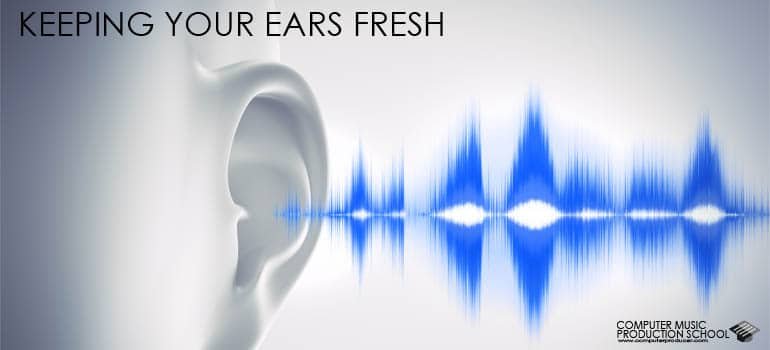Your ears are the most valuable and priceless gear you have. Not only will you need to take care of them for the duration of your life but also during day-to-day life and recording sessions. There is a well known music rule in our studio that never gets broken: Above all, protect your ears!
Here are five simple tips to keep your ears fresh while producing, recording and mixing in the studio for long hours:
1) Keep an Eye on Your Levels
Volume levels, that is.. If the bump of your speakers makes your coffee cup vibrate, you’ve got your volume jacked up way too high. It’s recommended to do all mixing in levels so low you could have a conversation without shouting. The reason for this is that over time your ears get tired and this can go unnoticed until it’s too late. The goal is to reference your music at conversation volume levels and only check the low end, high end and how everything fits in the mix at increased volume levels for increments of 2-5 minutes at a time. This method will keep your ears fresh for the rest of the day so you can produce, record and mix for the rest of the night.
2) When Recording your own Vocals
When recording yourself you juggle the roles of artist and recording engineer. It’s inspiring hearing everything come together. However, don’t be a hero and jack up the level in your headphones so that you’re screaming over the top. Typically most vocalists like to have one headphone cup off their ear and one on. If you’re doing vocal stacks it’s best to keep them both on and keep the volume level really low. If your volume is too high, it is easy for your vocal recordings to be sharp or flat. When recording, make sure to allow sufficient time for breaks, not only for your throat but for your ears.
3) Keep ‘em Clean
This may seem obvious but dirty ears are not only nasty but they hinder the sound quality of your listening. In any health food store you can purchase Ear Candles. These little bad boys will clean your ear canals so well that they actually warn you not to listen to music for 3 days after. Make sure you read the directions on the package carefully and follow them. You will be amazed by how much your hearing is improved by these. Try not to be grossed out by all the yucky wax and dirt that comes out of you either. Now I have had a few responses of people who do not agree or think this is a hoax. Maybe this option will help you, maybe it won’t, however, this is from my personal experience.
4) Editing Vocals
When editing double vocals or multiple tracks for long lengths of time, your ears can tire quickly. The way to work around this is to edit one phrase at a time until finding the best take and cut and paste accordingly. Listening to the whole take, take after take can get daunting and annoying. It’s much easier for your ears to pick up the differences in each track if you play it back phrase by phrase, take by take until you find the phrase that jumps out at you. Use the highlighting tool in your audio sequencer to mark which ones you like best and keep moving forward. You can also memorize an easy color system that reminds me which one is Best, Adlib, or 2nd Best, and so forth.
5) Take Breaks
When working on a project, reward yourself by taking fun breaks. After you edit the vocals, go for a short walk around the block. Done with mixing? Have your favorite snack. Make sure you take short breaks often. You’ll come back to your station with fresh ears and a fresh perspective every time.
Tutorial: Keeping your Ears Fresh During Recording and Mixing
1) How do you produce and mix your music (Headphones, Speakers, Both)? During your next session, pay attention to when you increase the volume and how long you listen to loud volumes. How long does it take to complete the project, do you have to redo the mix the next day, what do your clients say about your mixes – do you hear anything consistently?
2) Benchmark your system. In other words, set aside some time when you’re not busy, listen to commercially mastered CDs, reference conversation volume levels and increased volume levels, note the decibel level on your volume knob and then practice with your own material.
3) Let your ears rest. After a long session or when you sleep, put ear plugs in your ears and let them rest.
If you would like more info about volume levels, recording your own vocals and editing vocals,

